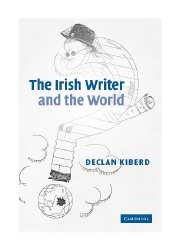Book contents
- Frontmatter
- Contents
- Acknowledgements
- A note on the text
- 1 Introduction
- 2 The fall of the Stage Irishman (1979)
- 3 Storytelling: the Gaelic tradition (1978)
- 4 Writers in quarantine? The case for Irish Studies (1979)
- 5 Synge, Yeats and bardic poetry (2002)
- 6 George Moore's Gaelic lawn party (1979)
- 7 The flowering tree: modern poetry in Irish (1989)
- 8 On national culture (2001)
- 9 White skins, black masks: Celticism and Négritude (1996)
- 10 From nationalism to liberation (1997)
- 11 The war against the past (1988)
- 12 The Elephant of Revolutionary Forgetfulness (1991)
- 13 Reinventing England (1999)
- 14 Museums and learning (2003)
- 15 Joyce's Ellmann, Ellmann's Joyce (1999)
- 16 Multiculturalism and artistic freedom: the strange death of Liberal Europe (1993)
- 17 The Celtic Tiger: a cultural history (2003)
- 18 The city in Irish culture (2002)
- 19 Strangers in their own country: multiculturalism in Ireland (2001)
- Index
2 - The fall of the Stage Irishman (1979)
Published online by Cambridge University Press: 22 September 2009
- Frontmatter
- Contents
- Acknowledgements
- A note on the text
- 1 Introduction
- 2 The fall of the Stage Irishman (1979)
- 3 Storytelling: the Gaelic tradition (1978)
- 4 Writers in quarantine? The case for Irish Studies (1979)
- 5 Synge, Yeats and bardic poetry (2002)
- 6 George Moore's Gaelic lawn party (1979)
- 7 The flowering tree: modern poetry in Irish (1989)
- 8 On national culture (2001)
- 9 White skins, black masks: Celticism and Négritude (1996)
- 10 From nationalism to liberation (1997)
- 11 The war against the past (1988)
- 12 The Elephant of Revolutionary Forgetfulness (1991)
- 13 Reinventing England (1999)
- 14 Museums and learning (2003)
- 15 Joyce's Ellmann, Ellmann's Joyce (1999)
- 16 Multiculturalism and artistic freedom: the strange death of Liberal Europe (1993)
- 17 The Celtic Tiger: a cultural history (2003)
- 18 The city in Irish culture (2002)
- 19 Strangers in their own country: multiculturalism in Ireland (2001)
- Index
Summary
In Shakespeare's Henry V we are given a fleeting glimpse of an Irishman named Macmorris, a captain in the king's army. In this splenetic figure, we find those traits of excitability, eloquence, pugnacity and strong national pride which would later become the stock-in-trade of the Stage Irishman. For Macmorris was, despite his fierce loyalty to the king, a figure of fun on the London stage. For some strange reason, generations of Englishmen, including the open-hearted Shakespeare, have found it amusing that the Irish should be proud of their own nationality. Some of the soldiers in the Globe audience would already have had grim experience of the Elizabethan military campaigns in Ireland, a campaign conducted in treacherous boglands into which the agile Irish repeatedly lured the enemy forces before battle. Hence the endless references to Irish bogs, bogtrotters and bogmen in the subsequent literature of England. Hence, too, the phrase ‘wild Irishman’ which was used as early as 1608 by the playwright Dekker in Lanthorn and Candlelight. By the time the theatres of England were closed under the Puritan ban of the 1640s, the rudimentary image of the Stage Irishman had been formed: he wore trousers, drank endlessly, swore wildly, and spoke a broken but colourful brand of English, salted with Gaelic exclamations. In the eighteenth century, new features were added: now the character invariably carried a shillelagh under his arm, ate potatoes as a staple diet and frequently appeared with a pig in close attendance.
- Type
- Chapter
- Information
- The Irish Writer and the World , pp. 21 - 41Publisher: Cambridge University PressPrint publication year: 2005



